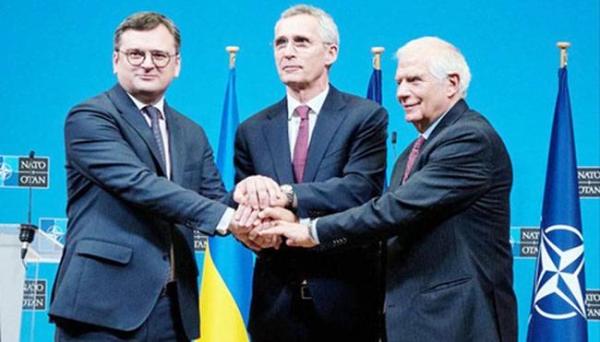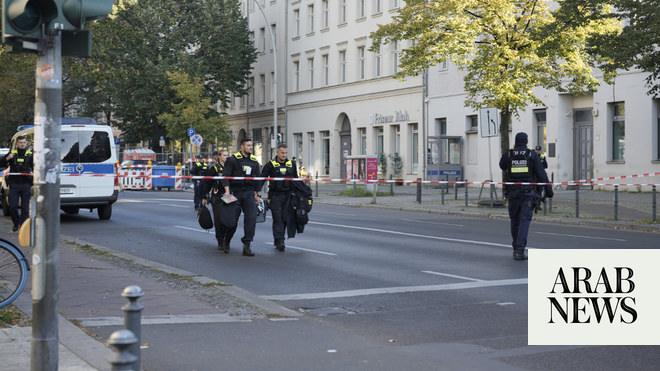
Survey finds Turkish public opinion expressing more trust for military alliance
Global risks around Turkey moving public to take cautious stance, says expert
ANKARA: A new survey has found that Turkish public opinion is more oriented toward international organizations such as NATO, reflecting a positive stance on the country’s EU membership bid.
The survey, titled “Turkish Perceptions of the European Union,” was conducted by the German Marshall Fund of the US with the field study carried out in March by Istanbul-based Infakto Research Workshop across 29 provinces of Turkey through face-to-face interviews with 2,180 people.
The survey revealed that 48 percent of respondents expressed trust in the EU, a rise from the 40 percent who said the same last year; 39 percent voiced support for NATO, a jump from 32 percent in 2021.
As a candidate for EU accession for 23 years and as a powerful member of NATO with increasing economic and military dependency on Russia, Turkey is now trying to find a place in the changing European security and political architectures.
NATO’s tough position on the Ukraine conflict also turned the public opinion in favor of the alliance, seeing it as a key pillar of Turkey’s security.
Ozgur Unluhisarcikli, the Ankara office director of the German Marshall Fund, said the relatively higher trust shown by the younger generation in Turkey toward international institutions is a reflection of their frustration with the conditions in Turkey.
“Economic challenges such as high inflation, eroding real earnings and unemployment, decreasing quality of education and the polarized political environment frustrate young people who are increasingly looking abroad for a way out,” he told Arab News.
Support for Turkey’s EU membership is high (58 percent) and even higher in the 18-24 age group (73 percent). However, the confidence that Turkey will become an EU member remains low, with average expectations for the accession timeline ranging between 10 to 15 years.
“In terms of realpolitik, both the Ukraine conflict and Syrian refugee crisis have definitely underlined to many policymakers in the EU about Turkey’s geostrategically important location,” Paul T. Levin, director at Stockholm University Institute for Turkish Studies, told Arab News.
“But this occurs against a deep unease with the current regime’s foreign policy and poor democratic record. Both sides are in a sense thrust together by geography and events and are struggling to find ways to coexist and collaborate despite serious value divergences and a defunct EU accession process that puts a premium on these divergences.”
The survey also revealed tendencies regarding other global actors and regions and showed that Russia’s invasion of Ukraine obliged Turkey to reconsider its relationship with Russia and the West.
Thirty-eight percent of respondents want Turkey to play a more active role in the Middle East, Balkans and North Africa, while 59 percent would prefer Ankara to deal with its domestic problems first.
One-third of the respondents think Turkey should cooperate most closely with EU countries on international issues.
Galip Dalay, a fellow at the Centre for Applied Turkey Studies at the German Institute for International and Security affairs, told Arab News that the increased public support for the EU accession bid and NATO reflects the pursuit in Turkey for democratization and more openness on the global scale.
Regarding the Ukrainian conflict, 44 percent of the respondents said Turkey should mediate between the parties, while 40 percent said Ankara should remain neutral.
“The survey clearly highlights that the Turkish public doesn’t want their country to be entangled in the war Russia is waging against Ukraine. The Turkish government’s policy of staying out of the conflict and attempting mediation has a strong public backing,” Unluhisarcikli of the German Marshall Fund said.
The survey also found that 58 percent of respondents consider the US its biggest threat, followed by Russia (31 percent, rising from 19 percent last year) and Israel (29 percent, rising from 24 percent in 2021).
“Russia’s invasion of Ukraine has significantly lowered the support to cooperate with Russia and increased the unilateralist tendencies rather than increasing support for cooperating with the US or the EU because pro-Russian sentiment in Turkey has always been another manifestation of being against the West,” said Unluhisarcikli.
When asked about how the conflict in Syria should be resolved, 50 percent of respondents said Syria’s territorial integrity should be maintained and the Assad regime replaced. But 21 percent said that Syria should go back to its status before the civil war under Assad’s leadership, with 17 percent believing that the Syrian opposition should have their own territory.
“The survey shows that roughly half of the Turkish public thinks that Assad should go and Syria’s territorial integrity should be maintained. This is also Turkey’s official policy. Those who support returning to the pre-war status quo under Assad’s leadership are less than 25 percent,” said Unluhisarcikli.
He added: “So I don’t think there is an expectation by the Turkish public to change the Syria policy. However, there is an increasing tendency to expect Turkey to solve its own problems rather than playing an active role in the neighborhood.”
In the meantime, 51 percent of respondents said Turkey and the EU had conflicting interests in the Syrian civil war.
With rising global risks around Turkey, which neighbors several conflict zones, Dalay said that the Turkish people will be inclined to take a cautious stance to minimize potential challenges.
“Despite the restrained approach of Turkish public opinion regarding the Syrian conflict, I don’t expect a quick normalization process with the Assad regime apart from some bilateral engagements at the intelligence and security levels,” he said.
Dalay believes that the dip in support for Russia and the enhanced trust in Brussels does not mean more leverage for Washington over Ankara.
“The reason is simple,” he said, “the EU is considered a domestic matter for Turkey thanks to its agency for uplifting the country’s democratic standards. However, the relationship with the US is often framed as a foreign policy and security matter where both sides have seen serious crises over the previous years. Therefore, the cautious stance in Turkey toward Washington is mostly linked with the traces that were left from the latest diplomatic blows.”












